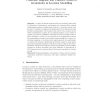Free Online Productivity Tools
i2Speak
i2Symbol
i2OCR
iTex2Img
iWeb2Print
iWeb2Shot
i2Type
iPdf2Split
iPdf2Merge
i2Bopomofo
i2Arabic
i2Style
i2Image
i2PDF
iLatex2Rtf
Sci2ools
101
click to vote
KI
2010
Springer
2010
Springer
Positions, Regions, and Clusters: Strata of Granularity in Location Modelling
Location models are data structures or knowledge bases used in Ubiquitous Computing for representing and reasoning about spatial relationships between so-called smart objects, i.e. everyday objects, such as cups or buildings, containing computational devices with sensors and wireless communication. The location of an object is in a location model either represented by a region, by a coordinate position, or by a cluster of regions or positions. Qualitative reasoning in location models could advance intelligence of devices, but is impeded by incompatibilities between the representation formats: topological reasoning applies to regions; directional reasoning, to positions; and reasoning about set-membership, to clusters. We present a mathematical structure based on scale spaces giving an integrated semantics to all three types of relations and representations. The structure reflects concepts of granularity and uncertainty relevant for location modelling, and gives semantics to applicatio...
| Added | 29 Jan 2011 |
| Updated | 29 Jan 2011 |
| Type | Journal |
| Year | 2010 |
| Where | KI |
| Authors | Hedda Rahel Schmidtke, Michael Beigl |
Comments (0)

